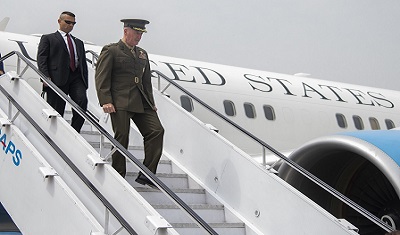U.S., Pakistani Leaders Agree to Reset Relationship: Jim Garamone
Pompeo and Dunford met with new Pakistani Prime Minister Imran Khan, Foreign Minister Mehmood Qureshi and Army Chief of Staff Gen. Qamar Javed Bajwa.
“We talked abut their new government and the opportunity to reset the relationship between our two countries across a broad spectrum: economic, business, commercial — the work that we all need to do to try to develop a peaceful resolution in Afghanistan,” Pompeo told reporters here.
Pompeo and Dunford stopped here on their way to the “Two-Plus-Two” talks with Indian leaders in New Delhi. It was the most senior meeting between the representatives of the U.S. government and Pakistan’s new government.
Dunford supported the secretary in his efforts to reset the relationship.
Consistent Objectives
 “When we talked to General Bajwa on a military-to-military level, we listened to the prime minister very carefully [and] we listened to the secretary very carefully. The objectives were very consistent between the secretary and prime minister,” Dunford said. “General Bajwa and I agreed that we will leverage the military-to-military relationship for the secretary and prime minister and, more importantly, for President Trump’s South Asia Strategy.”
“When we talked to General Bajwa on a military-to-military level, we listened to the prime minister very carefully [and] we listened to the secretary very carefully. The objectives were very consistent between the secretary and prime minister,” Dunford said. “General Bajwa and I agreed that we will leverage the military-to-military relationship for the secretary and prime minister and, more importantly, for President Trump’s South Asia Strategy.”
When President Donald J. Trump announced the South Asia Strategy, Pakistan had a large role to play. “The president’s South Asia strategy was pretty clearly articulated in 2017, and the expectations that we have that Pakistan will cooperate in bringing the Taliban to … an Afghan-owned, Afghan-led peace process is pretty clear as well,” Dunford said during an earlier discussion with reporters traveling with him. “I think our bilateral relationship moving forward is very much going to be informed by the degree of cooperation from Pakistan in doing it.”
Pakistan has a unique role in dealing with the Taliban, who operate in both Afghanistan and Pakistan. In announcing the strategy last year, Trump said that Pakistan “often gives safe haven to agents of chaos, violence and terror.”
He called on Pakistan to stop providing safe havens for terrorists who rest and refit for actions in Afghanistan and elsewhere. “Pakistan has much to lose by continuing to harbor criminals and terrorists,” the president said at the time.
Actions Must Back Up Words
Pakistani leaders have been fully briefed on the South Asia Strategy. “On the surface, they say they want to cooperate,” Dunford said earlier. “On the surface, they say they recognize that a peaceful solution in Afghanistan is the right approach. On the surface, they say they support an Afghan-owned, Afghan-led peace process. So what we are looking for is the actions to back that up.
“What we want to see: The Taliban at the peace table dealing with Afghans,” he continued. “And we believe the Pakistanis play a unique role in bringing the Taliban to the peace process.”
U.S. officials also believe Pakistan can have an effect on the Haqqani network, which has been a thorn in the side of coalition and Afghan government efforts in eastern Afghanistan for years. “We also believe the Pakistanis play a unique role in Haqqani’s behavior and the threats we have seen to NATO/allied forces, coalition forces and Afghan forces,” Dunford said.
Following the discussions, Pompeo said the military-to-military relationship underpins the move to reset the U.S.-Pakistani relationship. There will be more discussions ahead, and there must be more results, he said.
“The relationship — military-to-military — is one that has remained in a place where some of the other relationships haven’t, frankly. They still continued to have relations, worked on projects that are important together, and I hope we can use that as one of the foundational elements, as well.”
The bottom line with the talks is that the Pakistanis “agreed it is time to deliver on our joint commitments,” Pompeo said.
“We’ve had lots of time where we’ve talked and made agreements, but we haven’t been able to actually execute those,” he said. “So there was broad agreement … that we need to begin to do things on the ground that will deliver outcomes so we can begin to build confidence and trust between the two countries.”
(Follow Jim Garamone on Twitter: @GaramoneDoDNews)


